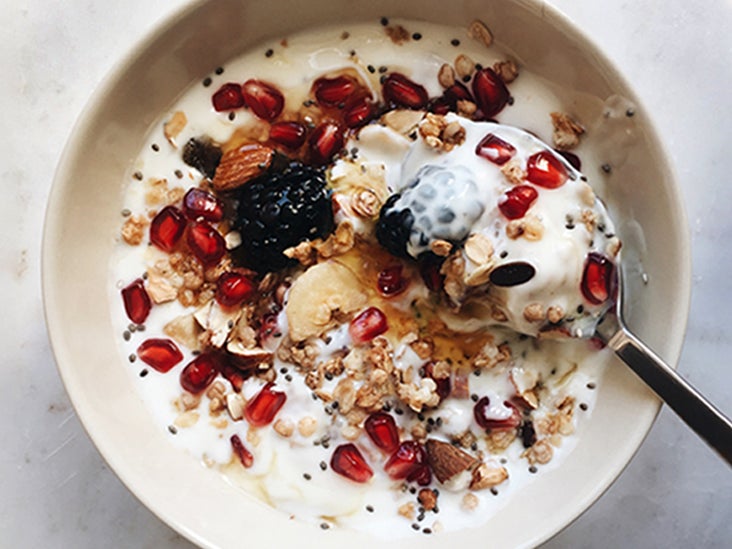Written by Adda Bjarnadottir, MS, RDN (Ice) — Medically reviewed by Grant Tinsley, Ph.D., CSCS,*D, CISSN, Nutrition — Updated on August 13, 2020
Pregnant? Hangry? Looking for a snack that will make your tummy and your baby happy? You’re probably hearing it a lot: Eating nutritious foods while pregnant is essential.
We’re here to make your pantry into a one-stop shop of healthy and delicious foods that will give your baby the best start to life.
When building your healthy eating plan, you’ll want to focus on whole foods that give you higher amounts of the good stuff you’d need when not pregnant such as:
- protein
- vitamins and minerals
- healthy types of fat
- complex carbohydrates
- fiber and fluids
Here are 13 super nutritious foods to eat when you’re pregnant to help make sure you’re hitting those nutrient goals.
1. Dairy products
During pregnancy, you need to consume extra protein and calcium to meet the needs of your growing little one. Dairy products like milk, cheese, and yogurt should be on the docket.
Dairy products contain two types of high-quality protein: casein and whey. Dairy is the best dietary source of calcium, and provides high amounts of phosphorus, B vitamins, magnesium, and zinc.
Yogurt, especially Greek yogurt, contains more calcium than most other dairy products and is especially beneficial. Some varieties also contain probiotic bacteria, which support digestive health.
If you’re lactose intolerant, you may also be able to tolerate yogurt, especially probiotic yogurt. Check with your doctor to see if you can test it out. A whole world of yogurt smoothies, parfaits, and lassi could be waiting.
2. Legumes
This group of food includes lentils, peas, beans, chickpeas, soybeans, and peanuts (aka all kinds of fabulous recipe ingredients!).
Legumes are great plant-based sources of fiber, protein, iron, folate, and calcium — all of which your body needs more of during pregnancy.
Folate is one of the most essential B vitamins (B9). It’s very important for you and baby, especially during the first trimester, and even before.
You’ll need at least 600 micrograms (mcg) of folate every day, which can be a challenge to achieve with foods alone. But adding in legumes can help get you there along with supplementation based on your doctor’s recommendation.
Legumes are generally very high in fiber, too. Some varieties are also high in iron, magnesium, and potassium. Consider adding legumes to your diet with meals like hummus on whole grain toast, black beans in a taco salad, or a lentil curry.
3. Sweet potatoes
Sweet potatoes are not only delicious cooked about a thousand ways, they’re also rich in beta carotene, a plant compound that is converted into vitamin A in your body.
Vitamin A is essential for baby’s development. Just watch out for excessive amounts of animal-based sources of vitamin A, such as organ meats, which can cause toxicity in high amounts.
Thankfully, sweet potatoes are an ample plant-based source of beta carotene and fiber. Fiber keeps you full longer, reduces blood sugar spikes, and improves digestive health (which can really help if that pregnancy constipation hits).
For a fab brekky, try sweet potatoes as a base for your morning avocado toast.
4. Salmon
Smoked on a whole wheat bagel, teriyaki grilled, or slathered in pesto, salmon is a welcome addition to this list. Salmon is rich in essential omega-3 fatty acids that have a host of benefits.
These are found in high amounts in seafood, and help build the brain and eyes of your baby and can even help increase gestational length.
But wait: Have you been told to limit your seafood intake due to the mercury and other contaminants found in high mercury fish? You can still eat fatty fish like salmon.
Here are the high mercury fish to avoid:
- swordfish
- shark
- king mackerel
- marlin
- bigeye tuna
- tilefish from the Gulf of Mexico
Plus, salmon is one of the very few natural sources of vitamin D, which is lacking for most of us. It’s important for bone health and immune function.
5. Eggs
Those incredible, edible eggs are the ultimate health food, as they contain a little bit of almost every nutrient you need. A large egg contains about 80 calories, high-quality protein, fat, and many vitamins and minerals.
Eggs are a great source of choline, a vital nutrient during pregnancy. It’s important in baby’s brain development and helps prevent developmental abnormalities of the brain and spine.
A single whole egg contains roughly 147 milligrams (mg)Trusted Source of choline, which will get you closer to the current recommended choline intake of 450 mg per day while pregnant (though more studies are being done to determine if that is enough).










